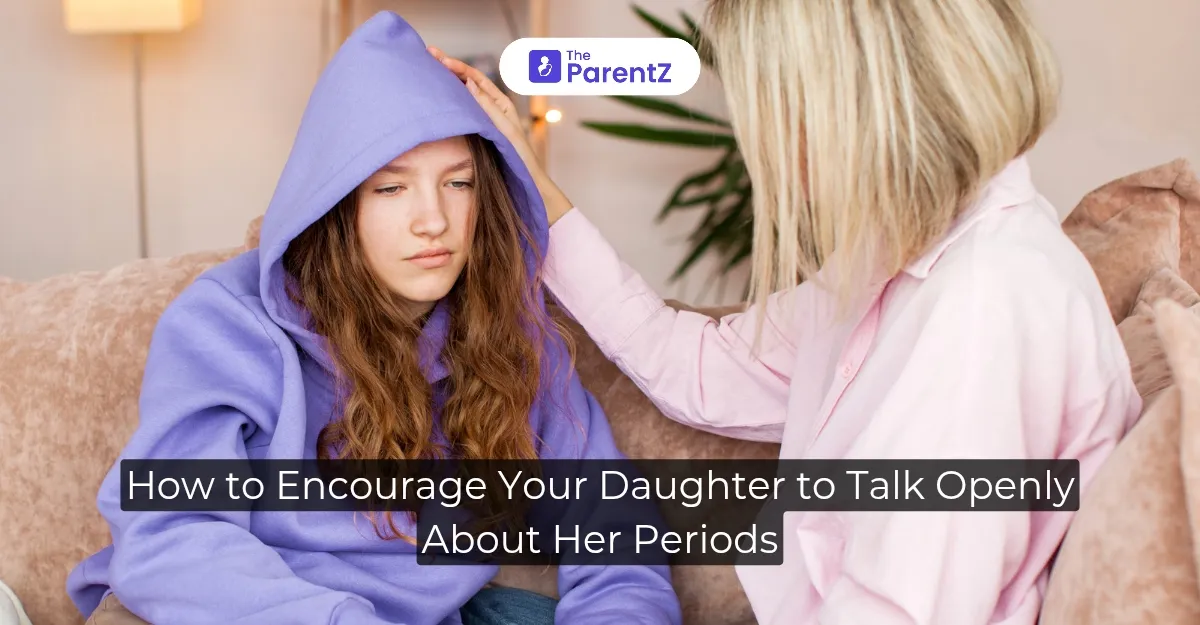Talking about periods has long been surrounded by stigma and discomfort, but it doesn’t have to be that way for your daughter. As she enters puberty, she needs reassurance that menstruation is normal, healthy, and nothing to be ashamed of.
Encouraging open conversations about her periods will help her feel more confident, informed, and comfortable seeking support when needed. Here’s how you can create a safe space for honest discussions.
1. Start the Conversation Early and Normalise It
Waiting until she gets her first period to talk about menstruation might make the conversation feel awkward or rushed. Instead, introduce the topic early in a casual and age-appropriate way.
How to Normalise Period Talk:
• Use correct terminology like “menstruation” and “period” instead of euphemisms.
• Talk about periods the same way you discuss other body changes, like growth spurts or voice changes.
• Mention periods naturally in everyday life (e.g., “Let me grab some pads before we head out”).
• Avoid whispering or acting embarrassed when discussing menstruation.
When she sees that you’re comfortable talking about periods, she’ll be more likely to feel comfortable too.
2. Create a Judgment-Free Safe Space
Your daughter should feel safe asking questions or sharing concerns about her periods without fear of being dismissed or judged.
How to Make Her Feel Safe:
• Reassure her that there are no “weird” or “wrong” questions.
• Listen without interrupting or correcting her immediately.
• Avoid dismissive phrases like “It’s not a big deal” or “Everyone goes through it.”
• Be patient—she might need time to open up fully.
Let her know that whatever she’s feeling—confusion, frustration, or even embarrassment—is completely valid.
3. Share Your Own Experiences (If You’re Comfortable)
Personal stories can make the topic feel more relatable and less intimidating. If you menstruate, share your first-period experience, funny moments, or even struggles you faced.
What You Can Talk About:
• How you felt when you got your first period
• Any embarrassing or awkward period stories (to lighten the mood)
• How you managed period cramps or discomfort
• What you wish you had known earlier about menstruation
By opening up, you’re showing her that periods are nothing to hide or feel ashamed of.
4. Provide Accurate and Reassuring Information
Misinformation about periods is common, and your daughter might pick up myths from friends, social media, or unreliable sources. Make sure she gets accurate information from you first.
Important Facts to Cover:
• Menstruation is a natural process that happens to all girls and women.
• The average cycle lasts 28 days, but it can range from 21 to 35 days.
• Periods can be irregular at first, and that’s completely normal.
• Period pain and PMS are common but can be managed.
• Hygiene practices, such as how often to change pads or tampons.
If you’re unsure about something, look it up together from reliable sources like medical websites.
5. Offer Practical Guidance Without Overwhelming Her
Your daughter may feel lost about how to handle her first period, so providing simple, step-by-step guidance can help.
What to Teach Her:
• How to use pads, tampons, and menstrual cups (let her choose what she’s comfortable with).
• How often to change period products to maintain hygiene.
• How to track her cycle using a calendar or a period-tracking app.
• Ways to relieve cramps, such as heat packs, gentle exercise, or hydration.
Keep the information practical and avoid bombarding her with too many details at once.
6. Keep Period Products Readily Available
Ensure she always has easy access to period supplies so she never feels unprepared or embarrassed to ask for them.
How to Make Period Products Accessible:
• Keep a small basket of pads, tampons, or menstrual cups in the bathroom.
• Show her how to discreetly carry period products in her bag for school or outings.
• Have emergency supplies in the car or other convenient places.
• Let her know she can always ask you to restock supplies without hesitation.
Making period products as normal as toilet paper helps remove the stigma around them.
7. Encourage Discussions with Trusted Friends or Family
While you might be her primary source of information, it’s helpful for her to talk to other women she trusts, such as older sisters, aunts, or close friends.
Why This Helps:
• She might feel more comfortable discussing certain topics with someone closer to her age.
• Different perspectives can help her feel reassured.
• Knowing that others have been through the same experience can reduce anxiety.
Encourage a positive attitude about periods among family and friends to make the conversation feel even more normal.
8. Address Emotional Aspects of Periods
Menstruation isn’t just a physical experience—it also comes with emotional ups and downs. Let your daughter know that mood swings, irritability, or feeling extra sensitive before or during her period is normal.
How to Support Her Emotionally:
• Validate her feelings—don’t tell her she’s “overreacting.”
• Encourage self-care practices, like journaling, warm baths, or meditation.
• Remind her that hormones can affect emotions but don’t define her personality.
• Be patient if she’s having a bad day and needs extra space or comfort.
When she knows her emotions are understood, she’ll feel more at ease talking about them.
9. Involve Dad or Male Family Members (If She’s Comfortable)
Menstruation isn’t just a “women’s issue”—dads, brothers, and male caregivers should also be part of the conversation in a supportive way.
How to Normalize Period Talk for Everyone:
• Encourage male family members to be understanding and respectful.
• If her dad is the primary caregiver, help him learn about periods so he can support her.
• Teach brothers or male cousins to avoid teasing and instead offer support if needed.
A home where everyone treats periods as normal reduces the embarrassment or shame associated with them.
10. Respect Her Comfort Level
Not all girls are immediately comfortable discussing their periods. Some take time to open up, and that’s okay.
What You Can Do:
• Let her know she can talk when she’s ready—don’t force conversations.
• Be available and approachable so she feels safe coming to you.
• Offer books, pamphlets, or videos that she can explore privately.
• Keep checking in occasionally without pressuring her.
As long as she knows she has a safe space, she’ll reach out when she needs to.
Final Thoughts
Encouraging your daughter to talk openly about her periods is one of the best ways to help her feel confident and prepared. By creating a judgment-free environment, providing accurate information, and being a supportive listener, you empower her to embrace this natural part of life without fear or embarrassment.
With time, open conversations will become second nature, making her feel secure and well-informed about her body.





Be the first one to comment on this story.